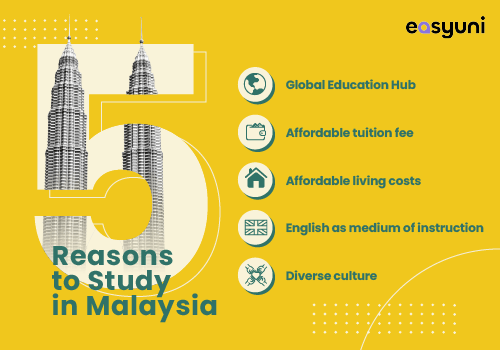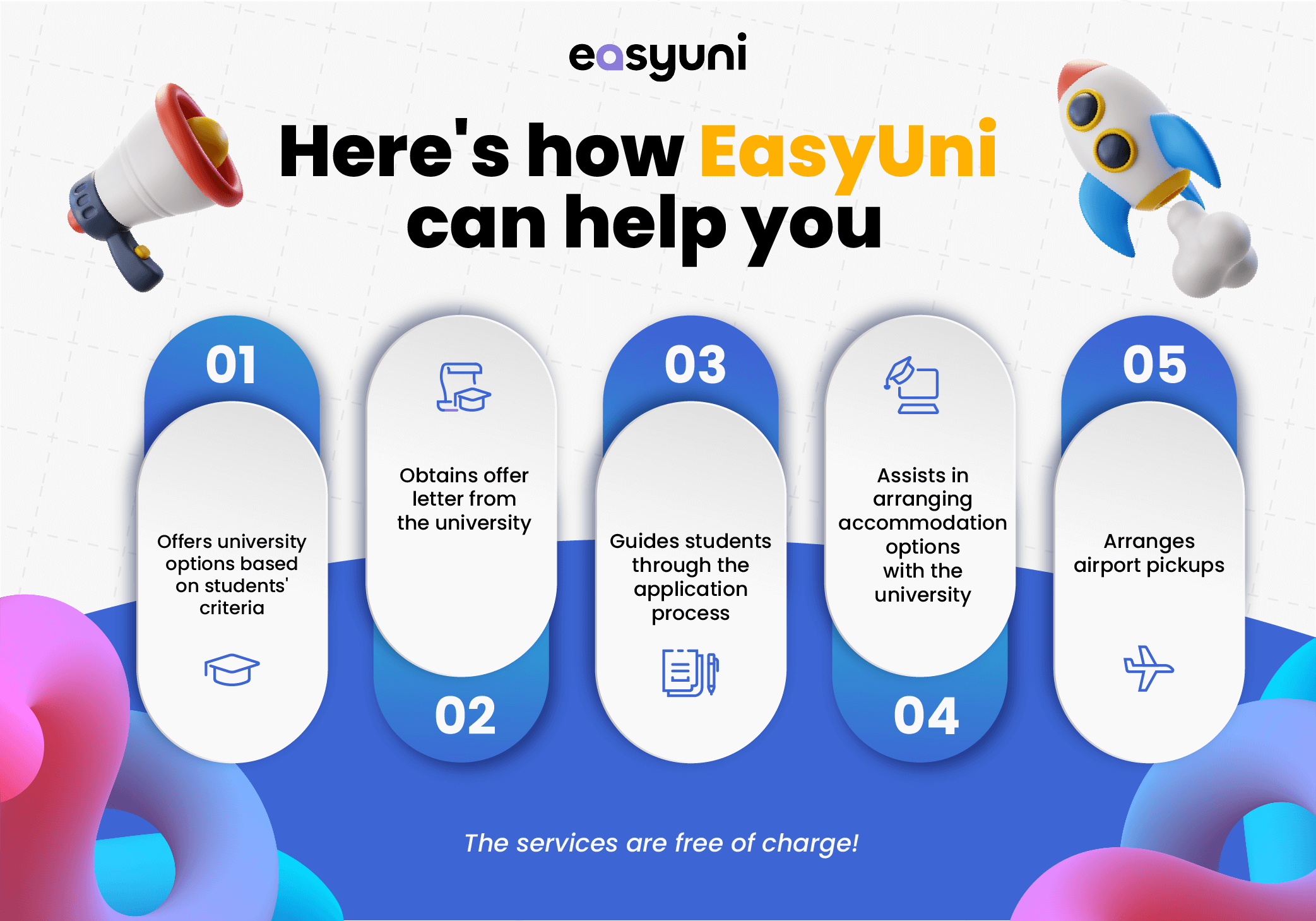Have you successfully completed your high school education, and are you currently exploring study-abroad options that align with your educational preferences? Are you wondering if there's a country that not only offers your desired course but also does so at a reasonable tuition fee?
You're in luck! This is a fantastic opportunity for you to consider Malaysia as your preferred educational destination.
Malaysia is widely acclaimed as a sought-after destination among international students, thanks to its budget-friendly tuition fees, high-quality education, and cultural diversity.
If you're thinking about studying in Malaysia for the first time, there's no need to worry! We are here to provide you with essential information, covering aspects such as visa applications, program-specific tuition fees, the cost of living, and other important details to help you make decisions. If you have any questions, feel free to contact us via WhatsApp or this form for personalized guidance, free of charge.
But first, let's go through this guide to ensure that choosing to study in Malaysia is the right decision before you start your educational journey there.
Is Malaysia a good choice for pursuing a university degree abroad?
Malaysia is a great choice for international students who want a good education without spending too much money.
The country has really good universities, and you can see this from their high positions in the QS World University Rankings. Because of the success of these universities, Malaysia is working hard to make education even better. They are always improving standards, teaching methods, and the facilities on campus.
Malaysia provides various academic programs and qualifications that are recognized globally, catering to students from all educational levels.
Whether you're pursuing for a Diploma, Bachelor's degree, Master's degree, or even a PhD, Malaysia has diverse offerings. This means you can pursue different levels of education, all of which are well-regarded internationally. What's even better is that, even though the education is high-quality, the cost is much lower than in many other countries.
So, if you want a good education without breaking your bank, Malaysia is a smart choice.
Universities in Malaysia also ensure that campus facilities are regularly updated, giving students the best learning experience. But is that all? No, Malaysia isn't just known for its education. It is a welcoming country where people from different backgrounds and beliefs live together peacefully. This is a good opportunity for international students to explore Malaysian traditions and cultures.
This inclusivity extends to the diverse food options available in Malaysia. Whether you crave Western or Middle Eastern cuisine, Malaysia has it all! You can find a variety of cuisines in local restaurants or university cafeterias.
As for the cost of living in Malaysia, there's no need to worry! The cost of living in Malaysia is reasonable. For example, you can choose on-campus or off-campus accommodation, and the price is just right. After discovering the potential opportunities, you may wonder how to apply to study in Malaysia. We've got you covered! We have prepared all the answers you need to kickstart your journey of studying in Malaysia as an international student.
Top 5 reasons to study in Malaysia
As an international student planning to study abroad, you might wonder, "Why study in Malaysia instead of other educational destinations?"
Here are some reasons why studying abroad in Malaysia is a great option:

Global education hub
Malaysia is an ideal international study destination because of its high-quality education. Malaysia's higher institutions offer many academic programs that meet international standards. From engineering, science streams, or business studies, you can choose the course that best suits your interests, budget, and career goals.
Other than that, Malaysia's universities also take initiatives to boost students' growth. As the job market gets more competitive, local universities actively form partnerships or collaboration events to refine the students' skills and gain practical experience.
Affordable tuition fees
Another reason why you must choose Malaysia as your educational destination is its affordable tuition fees. While some courses, like medicine, can be costly, they are still cheaper than in other countries.
Affordable living costs
Malaysia is widely known as a cost-effective choice for international students, offering a high-quality life at a reasonable cost. Living costs in Malaysia are generally lower than in Singapore and many Western countries. This makes Malaysia an appealing option for international students seeking quality education without breaking the bank.
Accommodation costs vary depending on location, but rentals are reasonably priced. Local street food is delicious and fits a student's budget well, contributing to lower food expenses. Public transportation is efficient and affordable, providing students with cost-effective commuting options.
Personal choices and lifestyle can influence the overall cost of living, yet many international students find pursuing their academic goals in Malaysia is affordable and fulfilling.
English as medium of instruction
Malaysia's universities conduct their classes in the English language. But if you have this question: "Do I have to be fluent in English to study there?" The answer is no. English proficiency in Malaysia does not require you to sound like a native speaker. However, you must understand the basic commands to engage in lectures, group discussions, and research projects.
Diverse culture
In Malaysia's universities, you'll find various cultures, creating a friendly and welcoming space. Malaysia is like a big pot of diverse backgrounds, bringing together people from different places, religions, and traditions. This mix makes your studying experience in Malaysia interesting. Plus, the university often organizes multicultural events where you can share your traditions. It's not only fun but also helps you appreciate different points of view.
Living in this mix of cultures will make you feel like you belong. So, studying in Malaysia isn't just about classes. You'll make friends worldwide and learn from diverse cultures.
Malaysia is a great choice for your study abroad plans. It has so much to offer like global education, affordable tuition fees, and living costs.If you’re considering studying in Malaysia, don’t hesitate to contact us on WhatsApp or email. We’re more than happy to help you find the right Malaysian university!
How to gain admission to a university in Malaysia?
Here comes one of the most important questions- how can you gain admission to a university in Malaysia?
The process of securing admission to a university in Malaysia is a step-by-step journey that prospective students must follow. It consists of many stages, such as the submission of applications, meeting eligibility criteria, and potentially engaging in entrance exams or interviews.
To successfully get into a university in Malaysia, it's important to understand and follow the specific rules of the chosen university. Also, meeting the academic requirements is essential. Taking these steps carefully helps make sure that people who want to study in Malaysia have a smooth and successful admission experience.
Reach out to us on WhatsApp or via this form for a personalized free consultation.
Explore universities and programs
The first step you must do is to explore Malaysia's universities and their offered programs.
You can browse the university list and courses on our website. When checking the university and programs, you must consider factors like academic reputation, facilities, and available courses.
Also read:
1. Choosing the right university and course in Malaysia
2. We Shortlisted 14 Universities in Malaysia for International Students
Check admission requirements
After you choose a university and program, you must review the specific admission requirements set by the institution.
And it is important to note that certain program levels and courses may require you to submit additional requirements, such as academic transcripts or letters of recommendation. So, make sure to carefully check the requirements of your selected program level and course.
Meet the admission requirements
For this step, you must ensure that you meet the academic criteria for the program you wish to apply for.
These criteria may include minimum academic qualifications, specific subjects studied, and additional entry requirements. If your previous academic qualifications are from a non-Malaysian institution, you need to check whether the qualifications are equivalent to the standards accepted by Malaysian universities.
Does that sound complicated to you? No worries. We can help you by checking whether your application meets the university’s eligibility criteria or not.
Prepare supporting documents
You must prepare supporting documents, such as academic transcripts, letters of recommendation, and a personal statement. While you prepare the documents, you must review that the information is accurate and professionally presented.
English language proficiency - must you take IELTS or TOEFL?
The answer is yes and no. Let us explain.
- If your previous school or university taught in English, you can request a letter from them confirming that English was the medium of instruction. In many situations, having this letter is sufficient to demonstrate your English proficiency, and you won't have to take the IELTS or TOEFL tests.
- If you have IGCSE O-Level, GCE A-Level, IB, CBSE qualification, you won't have to take the IELTS or TOEFL tests either.
- If the above don't apply to you, you will need to take the IELTS or TOEFL tests.
- However, if you unable to take those tests in your country, you have the option to study English at the university's English center in Malaysia (referring to the university where you plan to pursue your chosen degree). After completing the IELTS exam successfully, you can proceed with the program or degree.
Each Malaysian university has its own English proficiency standards, which can vary among courses and study levels. However, you should aim for a minimum of IELTS score of 5.0 or a TOEFL score of 70 for the Internet-based Test (iBT).
Also read: Types of English Language Proficiency Tests in Malaysia
Submit your application
Complete the university’s application form accurately by checking all the provided details Any late submissions may not be considered. So you must pay attention to the submission deadlines. For an easier way, you can contact our Study Advisor and we will guide you through the application submission, from A - Z.
Prepare for interviews, if required
Some universities may conduct interviews as part of the admission process. So, you can prepare by researching common questions on the Internet. And don't forget to practice your responses and highlight your passion for the program.
Important tip: During an interview, body language, tone, and eye contact are important. You can practice talking to yourself in front of the mirror and improvise on each aspect to deliver your response confidently.
Monitor application status
You must check the status of your university application regularly. You can do this by visiting the university's admission portal online or contacting the admission office.By monitoring your application status, you stay informed about its progress and any updates. If there are additional document requests from the university, you must address them promptly to ensure a smooth application process.
Visa application
After receiving the university's acceptance letter, you must apply for a visa promptly.
Starting the application early allows sufficient time for processing and ensures all travel requirements are met. Delays in visa processing may impact your arrival in Malaysia on time for the academic program. Therefore, you must submit the visa application in advance to ensure a smooth travel to Malaysia.
By following these steps, you are one step closer to studying in Malaysia as an international student.
How to get a Student Visa to study at a university in Malaysia?
In order to obtain a Student Visa you must first gain admission in a university in Malaysia.
The process is like this:
- You apply to a university.
- You get an Offer Letter from the university. Offer Letter states all the fees that need to be paid, should you accept.
- You pay student visa (EMGS) fees directly to the university's bank account - roughly USD 600-800.
- After receiving your payment, the university starts the Student Visa process.
- After the Immigration Malaysia approves, you will get Electronic Visa Approval Letter (eVAL). Steps 4 and 5 take around 4-8 weeks.
- With the eVAL you go the Malaysian Embassy and get a Single Entry Visa (SEV).
- You can buy a ticket and fly to Malaysia. You will be given a 30-day visa at the airport.
- You report to the International Office at the university and go through the onboarding process.
- After completing the onboarding process, you will give your passport to the International Office for them to send it to the Immigration Malaysia and affix the 12-month student visa.
Important: There are 2 important steps in the onboarding process:
- You must pay the initial fees at the Finance department. Initial fees usually includes the 1st semester fees, registration fees, deposits, etc. The amount to be paid will be stated on the Offer Letter.
- You must pass the medical check-up. Medical check-up fee is already included in the EMGS fees that you would have paid in Step 3 above.
Prepare documents for your Student Pass
Your university will need important documents to apply for a Student Pass on your behalf. The university will request the following documents:
- An official letter of acceptance from the university
- A completed student application form
- Three copies of your passport-sized photo
- One softcopy of your passport
- A copy of your medical health declaration form
Make payment for the Student Visa fee
After receiving the offer letter from the university, you must check the payment details. These fees cover both your application and Student Visa charges. The offer letter contains information about the university’s bank account.
Important: You must make the payment promptly to prevent any delay.
Your university will submit your documents
After you have paid the fees, the university will submit your documents to the authorities in Malaysia for your Student Visa approval. This usually takes 4-8 weeks. So, it's important to pay the fee promptly to avoid delays in getting your electronic Visa Approval Letter (eVAL). If you don't get it in time, it might affect your schedule for studying in Malaysia.
Receive your Electronic Visa Approval Letter (eVAL)
Once your Student Visa is approved, you will receive an email notification. With the approval letter, you are all set to come and study in Malaysia.
Important: Before your departure, make sure that you prepare documents, such as a passport, Student Pass approval letter, and others for immigration clearance.
Let EasyUni help you to gain a university admission in Malaysia

Let’s kickstart your university experience in Malaysia with us at EasyUni.
Our services aim to assist and guide you every step of the way. Here’s how we assist you:
- Shortlisting universities. We tailor our recommendations based on your criteria, ensuring you find the perfect fit for your academic journey.
- Getting offer letters from universities. We handle the paperwork, securing offer letters from the chosen universities to streamline your application process.
- Guiding through the application process. We guide you throughout the application process, providing clarity and assistance whenever you need it.
- Arranging accommodation. We help to organize your stay by facilitating accommodation options in collaboration with the university.
- Arranging airport pickup. We’ve got you covered with our airport pickup arrangements to ensure a smooth transition.
The best part of our services? All these services are free of charge.
Let EasyUni be your guide to making your academic dreams come true. Contact us on WhatsApp or via this form.
Top universities in Malaysia based on QS World Rankings
| No. | University | QS World Ranking |
| 1. | Universiti Malaya (UM) | 65 |
| 2. | University Sains Malaysia (USM) | 137 |
| 3. | Universiti Putra Malaysia (UPM) | 158 |
| 4. | Universiti Kebangsaan Malaysia (UKM) | 159 |
| 5. | Universiti Teknologi Malaysia | 188 |
| 6. | Taylor's University | 284 |
| 7. | UCSI University | 300 |
| 8. | Universiti Teknologi Petronas (UTP) | 307 |
| 9. | Universiti Utara Malaysia | 538 |
| 10. | Universiti Teknologi Mara - UiTM | 555 |
| 11. | INTI International University | 556 |
| 12. | Sunway University | 586 |
| 13. | Asia Pacific University of Technology and Innovation (APU) Malaysia | 621 - 630 |
| 14. | Management and Science University | 621 - 630 |
| 15. | International Islamic University Malaysia (IIUM) | 711 - 720 |
| 16. | Universiti Tenaga Nasional (UNITEN) | 761 - 770 |
| 17. | universiti Malaysia Pahang | 781 - 790 |
| 18. | Universiti Tunku Abdul Rahman (UTAR) | 801 - 850 |
| 19. | universiti Pendidikan Sultan Idris (UPSI) | 951 - 1000 |
| 20. | Multimedia University (MMU) | 1001 - 1200 |
| 21. | Universiti Kuala Lumpur (UniKL) | 1001 - 1200 |
Universities in Malaysia
-

SEGi University Kota Damansara
FeaturedSelangor, Malaysia
-

Malaysia
-

Sunway College
FeaturedPetaling Jaya, Selangor, Malaysia
-

University of Cyberjaya (UoC)
FeaturedMalaysia
-

Kuala Lumpur, WP Kuala Lumpur, Malaysia
-

UCSI University
FeaturedMalaysia
-

Sunway University
FeaturedPetaling Jaya, Selangor, Malaysia
-

Malaysia
-

UOW Malaysia KDU University College
FeaturedShah Alam, Selangor, Malaysia
-

Kuala Lumpur, WP Kuala Lumpur, Malaysia
See more related universities
Tuition fees in Malaysia
The tuition fees for Malaysia's higher institutions vary based on factors such as the course and whether it's a public or private institution. We provide the estimated tuition fee based on the program:
| Program | Tuition fee |
| Business Studies | USD 3000 - 6000 per year |
| Computer Science | USD 3000 - 6000 per year |
| Engineering | USD 4000 - 7000 per year |
| Medicine (MBBS or MD) | USD 18000 - 20000 per year |
| Nursing | USD 4000 - 5000 per year |
| Others | USD 3000 - 7000 per year |
If you need assistance choosing the right university or course, feel free to contact us via email or WhatsApp. We're here to assist you in choosing the right university for you.
Financial aid and Scholarships
In Malaysia, education is not free - students must pay tuition fees to attend universities. However, the universities do provide partial scholarships to eligible students. These scholarships are granted based on the student's past academic performance and results. The scholarship amount can also range from 10% to 50% of the normal tuition fees.
Send your documents to us and we can check if you’re eligible for any partial scholarships.
Living cost in Malaysia
Living in Malaysia as an international student is affordable and comfortable. The cost of living here is lower than in other countries, making it a great choice. Here's a quick guide to help you understand the factors contributing to the cost of living in Malaysia.
Accommodation
You can choose to stay on campus or find off-campus accommodation based on what suits you best and your budget.
On-campus accommodation
Universities in Malaysia provide dormitories or hostels where students can reside. These are shared living spaces with common facilities such as communal kitchens, laundry areas, and study rooms. One of the benefits of on-campus living is that rental costs often include essential utilities like electricity, water, and Wi-Fi. On-campus accommodation offers different types of rooms, including shared rooms for two or more students or single rooms for more privacy. The cost may vary based on the chosen room type. On average, you may expect to budget between USD 63 to USD 210 per month, depending on the university's policies and the chosen accommodation.
Off-campus accommodation
You can also rent apartments, shared houses, or other private accommodations. Monthly rental costs for off-campus housing can vary due to the accommodation's location, size, and amenities. You may need to budget between USD 147 to USD 421 per month for off-campus accommodation. This range allows for flexibility based on individual preferences, facilities, and location.
Food and groceries
Local markets and eateries offer plenty of tasty and affordable options. You might spend around USD 147 to USD 210 monthly for food and groceries.
Transportation
Public transportation, like buses and trains, is efficient and reasonably priced, making it easy to get around. You can expect to spend about USD 21 to USD 31 per month on transportation.
Healthcare
Most universities in Malaysia collaborate with trusted insurance providers to offer international students affordable health insurance. The insurance usually includes hospitalization and accident coverage. However, dental treatment in Malaysia can be costly depending on the type of procedure, such as fillings and root canals, and other factors. Therefore, it's advisable to undergo a dental check-up in your home country. This way, you can manage your healthcare needs and expenses while studying in Malaysia.
Utilities and Internet
The costs for utilities, like electricity, water, and gas, can vary based on your accommodation type and usage.
For on-campus accommodation, some universities include utility fees in the overall accommodation costs, so you won't need to pay separately. If you're living off-campus, you might spend approximately USD21 to USD42 monthly on utilities.
As for internet expenses, the cost depends on the provider and plan. Monthly subscriptions can range from USD 17 to USD 31, depending on speed and data limits.
Clothing expenses
The cost of clothing in Malaysia depends on individual preferences, lifestyle, and shopping habits. Local markets and street vendors, such as night markets or bundle stores, offer budget-friendly clothing options. You might spend approximately USD 21 to USD63 per month on clothes. This cost estimation considers a mix of affordable local market finds, occasional mid-range brand purchases, and potential sales or promotional discounts. But if you prefer international brands or shopping at malls, prices may be higher, but you'll find a variety of styles.
Miscellaneous expenses
You can enjoy various activities without worrying too much about the cost. On average, you can plan to spend around USD 42 to USD 63 per month on entertainment and miscellaneous expenses.
FAQs
1. Can I bring my dependents to Malaysia?
You are allowed to bring your dependents. This applies only if you are studying full time in Malaysia on a course/programme that is more than twelve (12) months long.
2. Is there a specific level of study that allows me to bring my dependents to Malaysia?
Yes. If you are pursuing a postgraduate program, you can apply for a dependent pass for your family. But, if you enroll in a Certificate/Diploma program, bringing dependents is not allowed.
3. Who are considered to be my dependents?
Only your immediate family members, such as parents, spouse, and children.
4. Do my dependents need a pass to enter Malaysia?
Yes. The dependent pass application should be made through your institution. Each dependent must submit a separate application.
5. What is the validity duration for my Student Pass?
The student pass is valid for twelve (12) months.









